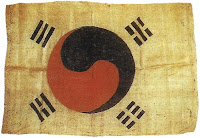
The Catholic Church in Korea has little historical material on the part the Catholics played in the Independence movement . They do have the example of Ahn jung-geun (Thomas) who assassinated the first Prime Minister of Japan in 1909. This year is the 100th anniversary of the incident in the Harbin railroad station.
Just recently they have found some material in old Manchuria which has been great news for the Church . The Church in Korea during colonial times was administered by foreign missionaries who were not too keen in getting involved in what they thought were politics. They wanted a strong separation of Church and State. "Breaking off dialogue with traditional religions and the Protestant Church was an aspect of the Korean Catholic Church's history during the colonial period. At that time it was only through religion that one could organize or form solidarity with others. It was the most convenient way for Koreans to get together because the colonial officials banned Koreans from forming civil associations. Religious leaders, speaking out in solidarity with the people, influenced public opinion."
"The Catholic Church, isolating itself from other religions and refusing relations with them, even further restricted Catholic influence in Korean society. For example, the Catholic Church was the only major religion not represented in the March 1st Independence Movement leadership which was the most important Korean independence movement against Japanese rule, initially organized and run by religious leaders." This has been an area that the Church reflects on with some sadness. Check the Bishop's website for information on the The Nationalism of the Korean Catholic Church during colonial rule.
The historical material that was found showed that the Catholics did get behind the independence movement. They raised funds, bought munitions, bore arms and fought against the Japanese and went to prison. There is enough information to counter the prevalent idea that the Catholics were indifferent to the occupation of the Japanese. This is more meaningful when one remembers that the official Church was against getting involved in the independence movement.
No comments:
Post a Comment